Special Events
The Willson Center supports numerous public events each academic year outside of its recurring grant-funded programs. Many of these events are hosted and sponsored by the Willson Center itself, or in collaboration with on- and off-campus partners. Others are hosted by faculty and/or students with Willson Center support through Research Seminars, Research Clusters, Mellon Foundation-funded Global Georgia projects, and other programs.
2023 – 2024
Handshouse Studio: Notre-Dame Project
Date: Feb. 9, 2024
The Notre-Dame Project is an initiative that began in 2021, when Handshouse Studio led a team of experts and students in Washington, DC to begin reconstructing one of the trusses that once supported the great cathedral’s roof, which was destroyed by fire in 2019.
Handshouse Studio is a non-profit, innovative, educational organization that creates adventurous hands-on projects through community service, building projects with partners around the world as a way to illuminate history, understand science, and perpetuate the arts.
Handshouse brought its La Forêt Model Workshop to the Dodd in September and October, 2022. Students participated in the crafting of a 1:10 scale white oak model of the intricate wooden roof framework of the Notre-Dame Choir, destroyed in the 2019 fire. That workshop and a corresponding public presentation were also presented in partnership with the Willson Center.
The project’s leaders returned to the UGA campus for this new five-day workshop devoted to the ongoing project, capped by a public open studio event and panel conversation.

2022 – 2023
Workshop: Food, Philosophy and Art in the US and Mexico
Date: Sept. 15, 2022
Food, Philosophy and Art in the US and Mexico was a research project funded by the Office of Global Engagement, the department of philosophy, the Franklin College of Arts and Sciences, and the Willson Center.
For this two-day workshop, scholars from Mexico City and Madrid spoke about philosophical and anthropological issues related to the aesthetics of food. Prior to the public workshops, Juan Escalona – a young Mexico City cook and scholar who has worked at Noma, Pujol and Máximo Bistrot –prepared a meal for invited guests at The National that explored the diversity of Mexican culture. At the workshops, Escalona talked about that meal and his work with the Mexico City collective Sexto.
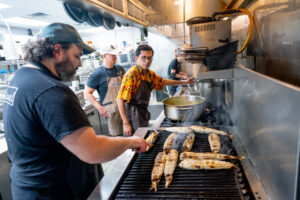
Exhibition: Anina Major and Tamika Galanis
Date: Sept. 17-Nov. 30, 2022
“The Ties That Bind: The Paradox of Cultural Survival amid Climate Events,” an exhibition of sculpture by Anina Major and photography by Tamika Galanis, was on display at the Lyndon House Art Center from Sept. 17 through Nov. 30, 2022. The exhibit was a partnership between the Lyndon House and the Willson Center for Humanities and Arts.
This exhibition originated on St. Helena Island, SC during an artist residency in which the artists examined cultural identity and sustainability through environmental relationships. Galanis and Major are both from The Bahamas and now based in Atlanta and New York City respectively. Both multimedia artists’ work interrogates popular conceptions of place: Major’s through investigating “the relationship between self and place as a site of negotiation,” and Galanis’s by examining “the complexities of living in a place shrouded in tourism’s ideal during the age of climate concerns.”
The artists’ work inspired by this residency explored notions of life in the Sea Islands of South Carolina and The Bahama Islands.
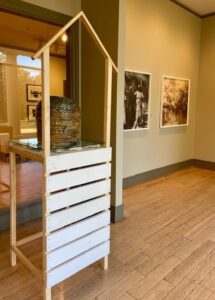
Screening and conversation: Barmmy Boy
Date: Sept. 20, 2022
The Center on Human Trafficking Research & Outreach (CenHTRO) and the Willson Center for Humanities & Arts presented “Storytelling Sierra Leone’s Insecurity: Filmmaker Barmmy Boy Documents Labor, Life, and Precarity in West Africa,” a screening of short documentaries about human trafficking and child labor in Sierra Leone followed by a conversation with the filmmaker.
Directed by multimedia storyteller Barmmy Boy, the documentaries offer a clear-eyed portrayal of life in Sierra Leone and the vulnerabilities that can lead to situations of human trafficking and other forms of exploitation. Following the screening, the Emmy and Peabody Award nominated filmmaker took part in a Q&A. CenHTRO Director David Okech also discussed how CenHTRO combats human trafficking in Sierra Leone and around the world.
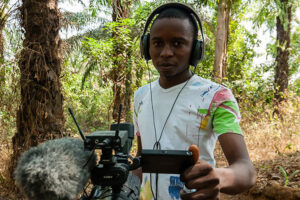
Lunchtime Series: Screen Time with Your Humanities Professors
Date: Multiple dates
The humanities faculty at UGA piloted a new series on campus featuring accessible talks about TV shows: Screen Time with Your Humanities Professors. The series “highlights the sorts of questions and analytical modes that are characteristic of humanistic thinking, while making connections through mutual interests in pop culture. It’s an a.v.-club-slash-humanities spin on UGA’s motto, Et docere et rerum exquirere causas.”
All events took place at the Athenaeum.
Talks were followed by questions and discussion. The series was sponsored by the Franklin College of Arts and Sciences and by the Willson Center.
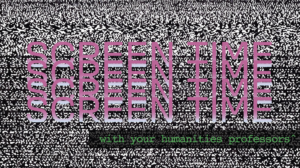
Screening: Theaters of War: How the Pentagon and CIA Took Hollywood
Date: Sept. 25, 2022
This special free community screening of Theaters of War: How the Pentagon and CIA Took Hollywood (2022), followed by a Q&A with director Roger Stahl, professor of communication studies at UGA, was presented with support from the Willson Center.
Those who have seen Top Gun or Transformers might rightly suspect all that military machinery comes with strings attached. This influence is not limited to a handful of movies, though. A vast new trove of internal documents reveals that the Pentagon and CIA have doctored thousands of film and television scripts. Parting the curtains on this world, communication professor Roger Stahl engages an array of other stunned scholars, frustrated veterans, PR insiders, and industry producers. He reveals in unsettling detail how the US military-industrial complex pushes a version of history that scrubs the screen of war crimes, corruption, criticism of the nuclear arsenal, racism, sexual assault, assassinations, and torture. From James Bond to Jack Ryan, Captain Marvel to Cake Boss, the creation of this other “cinematic universe” is one of the great PR coups of our time.
Theaters of War is distributed by the Media Education Foundation and is an “Official Selection” of the Barcelona Human Rights Film Festival.
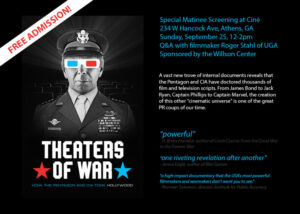
Douglas Kearney: An Experimental Dialogue
Date: Sept. 27, 2022
Douglas Kearney is a poet, performer, and librettist who has published seven books that bridge thematic concerns such as politics, African-American culture, masks, the Trickster figure, and contemporary music. His most recent book, Sho (Wave Books, 2021), was the winner for the 2022 Griffin Poetry Prize, the 2022 Minnesota Book Award for Poetry, and was a finalist for the National Book Award, the PEN/Voelcker Award, and the Kingsley Tufts Award.
This program was co-sponsored by the UGA English Department, The Georgia Review, and the Willson Center.
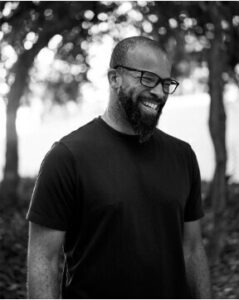
Lecture: Florence Dore
Date: Sept. 29, 2022
Florence Dore, professor of English and comparative literature at the University of North Carolina–Chapel Hill, gave a talk on “Modernism’s Vernacular: Zora Neale Hurston, Folk Music, and the High Literary.” The event was sponsored by the Willson Center, the department of English, the Barbara Methvin Chair in English, and the Institute for African American Studies. Dore’s visit also included a workshop with students at Clarke Central High School and a musical performance at Hendershot’s.
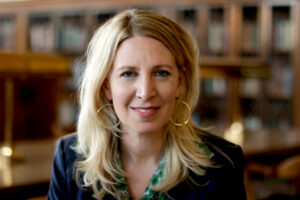
Screening of Trouble Sleep (2020) with director Alain Kassanda
Date: Oct. 12, 2022
Spoken-word artist, musician, and filmmaker Alain Kassanda was born in Democratic Republic of Congo and has lived in France since the age of 11. Trouble Sleep, its title drawn from the great Fela Kuti, follows two young taxi drivers as they navigate the crowded streets of Ibadan, Nigeria. An innovative city symphony that reveals the rules governing seeming chaos, Kassanda’s new documentary has been featured at Visions du Réel, DOK Leipzig, and Open City Documentary Film Festival, among others.
Kassanda’s visit to UGA was sponsored by the Willson Center and the Department of Romance Languages.
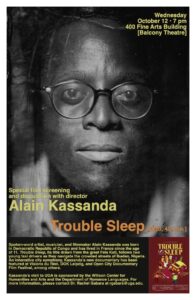
Georgia Humanities Symposium: Savannah, Ga.
Date: Oct. 14, 2022
In partnership with Georgia Humanities and Savannah State University, the Willson Center hosted the third Georgia Humanities Symposium, a national conversation on the public humanities, at the Savannah Cultural Arts Center in Savannah, Ga.
The program was supported by a grant from the Mellon Foundation and included speakers from a diverse range of institutions and organizations, including Savannah State, Morehouse College, Emory University, The University of Pittsburgh, Savannah College of Art and Design, UGA, Penn Center of St. Helena Island, S.C., and Save Our Legacy Ourself of Sapelo Island, Ga.
The conversation was free and open to the public, and travel support was made available to participants. On Saturday, October 15 there was an additional free option to join a three-hour Eco Adventure Cruise.
This was the third of three annual meetings during which participants shared experiences of projects, grants, and innovations in humanities research and teaching. Previous symposia were held in Athens and Columbus, Ga.
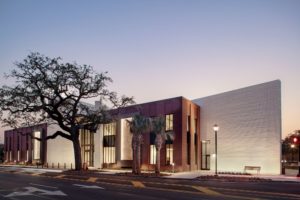
2022 African Studies Fall Lecture: Todd Ferry
Date: Oct. 20, 2022
The 2022 African Studies Fall Lecture, “Place, Process, and the Public: Designing for Community Impact,” was given by Todd Ferry, senior research associate and associate director of the Center for Public Interest Design at Portland State University. A UGA alumnus, Ferry is an architect and national leader in the field of public interest design.
In the lecture, he discussed ways in which architecture can better support traditionally underserved communities and ecologies through radically participatory processes in areas such as homelessness, disaster recovery, and mobile placemaking. He shared his work and how his experience with UGA’s African Studies Institute as an undergraduate led him to a career in architecture and continues to inform his practice and role in the Center for Public Interest Design.
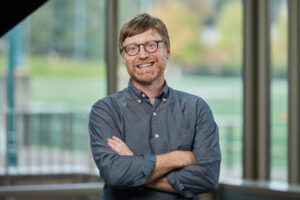
Concert: Athens Hip Hop Harmonic
Date: Oct. 20, 2022
Launched in August 2021, the Athens Hip Hop Harmonic is a multi-year collaboration between the local Hip Hop community and the UGA Hodgson School of Music, supported by UGA’s Arts Lab. It is produced by saxophone professor Connie Frigo, who developed it in collaboration with Athens Hip Hop impresario Montu Miller and Mariah Parker (aka Linqua Franqa), along with a team of other artists, educators, and supporters eager to create music together to explore their mutual artistic and cultural curiosities.
Building upon creative partnerships that began last year, this special show at the UGA Performing Arts Center featured premieres of music co-created by four Hip Hop artists and four UGA composers, performed by four UGA ensembles. Approximately 100 undergraduate and graduate student performers were involved. Montu Miller served as emcee.
Hip Hop artists included Athens Music Walk of Fame inductee Ishues, the 2020 Vic Chesnutt Songwriter of the Year Cassie Chantel, alternative R&B singer Convict Julie, and poet and spoken word performer Celest Ngeve.
UGA composers included piano and African American studies professor James Weidman, commercial music and media professor Tom Hiel, composition/music education major Ayako Pederson-Takeda, and composition/performance major Julien Berger.
The featured UGA ensembles were the African American Choral Ensemble, Jazz Combo, Wind Symphony, and Contemporary Chamber Ensemble.
The project’s collaborative performances can be seen and heard on the AHHH Youtube channel.
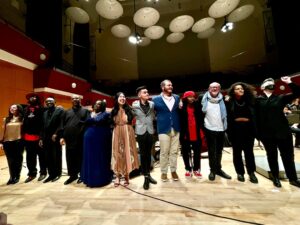
Reckonings and Reconstructions: Southern Photography’s Past and Futures
Date: Oct. 22, 2022
The Georgia Museum of Art, the University of Georgia Press, and the Willson Center presented a day-long symposium in conjunction with the exhibition “Reckonings and Reconstructions: Southern Photography from the Do Good Fund.” Two panels were held at the museum in the morning, followed by afternoon and evening events focusing on the rich history of music and alternative culture in Athens; collaborations with the Bitter Southerner and The Humid, an ambitious photography incubator and education space in Athens with a global reach; and opportunities for community building around savory southern food. More information at georgiamuseum.org/reckonings-symposium.

The Law of Global Economic Statecraft
Date: Oct. 24, 2022
This symposium surveyed the current state of economic statecraft – the tools in use, their purposes, and their targets. It explored how they are or should be regulated. But most importantly, it seeks to put today’s economic statecraft in historical, political, and legal context asking critical questions about the international order they reflect and the international order they might require. The symposium included a special keynote discussion with Nicholas Mulder, author of The Economic Weapon: The Rise of Sanctions as a Tool of Modern War. It was sponsored by the Dean Rusk International Law Center and the Georgia Journal of International and Comparative Law, with support from te Willson Center and other units on campus.

2021 – 2022
Lecture: Cynthia Barnett
Date: Sept. 9, 2021
Cynthia Barnett, Environmental Journalist in Residence at the University of Florida’s College of Journalism and Communications in Gainesville, Florida, took part in an online conversation with Nicholas Allen, Baldwin Professor in Humanities at UGA and director of the Willson Center for Humanities and Arts. The event is part of the Willson Center’s Director’s Series of conversations, curated by Allen.
Barnett is an award-winning environmental journalist who has reported on water and climate change around the world. Her new book, The Sound of the Sea: Seashells and the Fate of the Oceans (W. W. Norton, July 2021), is a natural and cultural history of seashells and the animals that make them—revealing what they have to tell us about nature, our changing oceans, and ourselves.
Barnett is also the author of Rain: A Natural and Cultural History, longlisted for the National Book Award and a finalist for the 2016 PEN/E.O. Wilson Literary Science Writing Award; Blue Revolution: Unmaking America’s Water Crisis, which articulates a water ethic for America; and Mirage: Florida and the Vanishing Water of the Eastern U.S. She has written for National Geographic, The New York Times, Los Angeles Times, Wall Street Journal, The Atlantic, and many other publications.
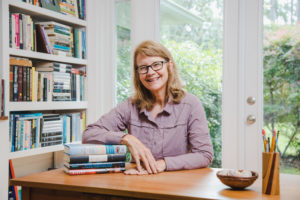
Lecture: Christy Pichichero
Date: Sept. 29, 2021
“TALKING B(L)ACK: Theorizing Race and its Intersections in Critical Eighteenth-Century Studies,” Christy Pichichero, George Mason University.
Part of a virtual speaker series on Gender and Race in Europe, presented by the History and Gender Workshop, a Research Seminar supported by the Willson Center and by the Department of History.
Pichichero is a literary scholar and cultural historian of early modern France and the French Empire. Her research is deeply interdisciplinary and her work on neoclassical French theater, early modern theories of language, the culture of war, the history of emotions, Critical Race Theory, and multiculturalism have appeared in venues such as French Historical Studies, Modern Language Notes, Renaissance Drama, and Studies in Eighteenth-Century Culture.
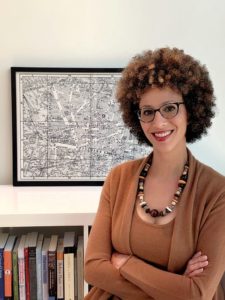
2020 – 2021
Lecture: Jerry Taylor
Date: Sept. 14, 2020
“The Influence of White Supremacy on the Church in the South,” Dr. Jerry Taylor, Abilene Christian University. The lecture was presented by the Religion and Common Good Seminar, a Willson Center Research Seminar.
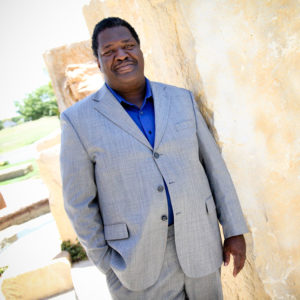
Lecture: Johanna Drucker
Date: Sept. 25, 2020
“Rethinking Assumptions: The Current Value(s) of Academic Work,” Johanna Drucker, Distinguished Professor and Breslauer Professor, department of information studies, UCLA. The lecture was hosted by the Office of the Provost, the Willson Center, the UGA Libraries, and the Franklin College of Arts and Sciences as part of the UGA Signature Lectures series.
Drucker is internationally known for her work in the history of graphic design, typography, experimental poetry, fine art, and digital humanities.
Abstract: Events of the last half year have changed the way we work. They have also shifted the frameworks within which we conceive of the value(s) of the intellectual activities to which scholars have long been committed. Social and economic impacts on higher education are apparent, no matter where one sits on the ideological spectrum. Six months ago, this talk would have focused on visual epistemology, digital humanities, aesthetics and other issues crucial to knowledge production. Now it feels urgent to address the very foundations on which we frame and justify the work we are doing. Drawing on personal and professional experience, this talk is an invitation to think collectively about the values on which our work proceeds.
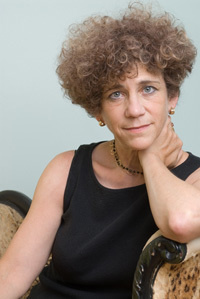
Lecture: Nicholas Jones
Date: Sept. 29, 2020
“Staging Habla de Negros in Iberian Early Modernity,” Nicholas Jones, assistant professor, Spanish and Africana Studies, Bucknell University. Jones’s lecture was co-hosted by the Bulletin of the Comediantes and the Early Modern Studies Research Group, an Andrew W. Mellon Foundation grant-funded research project in the Global Georgia Initiative of the Willson Center.

Lecture: Tamara Walker
Date: Oct. 5, 2020
“Exquisite Slaves: Race, Clothing, and Status in Colonial Lima,” Tamara Walker, associate professor of history, University of Toronto. The lecture was part of a series on Gender, Race, and Slavery in the Atlantic World, presented by the History and Gender Workshop, Willson Center Research Seminar.
Walker discussed her book, Exquisite Slaves: Race, Clothing, and Status in Colonial Lima (Cambridge, 2017). Walker’s scholarship focuses on three interrelated thematic areas: the history of slavery and freedom in Latin America; the process of racial formation in the region; and the ways in which gender shaped the experience of enslavement and racialization.
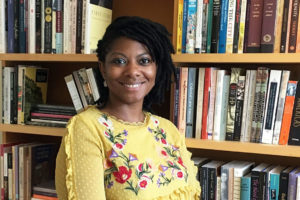
2019 – 2020
Lecture: Mary Ellen Curtin
Date: Sept. 16, 2019
“Was It Justice? Convict Labor And The Practice Of Punishment In America,” a lecture by Mary Ellen Curtin, associate professor of history at American University. The lecture explored the history of forced labor as legal punishment for men and women, black and white.
The event was co-sponsored by Hargrett Rare Book and Manuscript Library, the departments of English and history, the Institute for African American Studies, the Institute for Women’s Studies, and the Willson Center in conjunction with the Hargrett Library’s exhibit The New South and New Slavery: Convict Labor in Georgia.
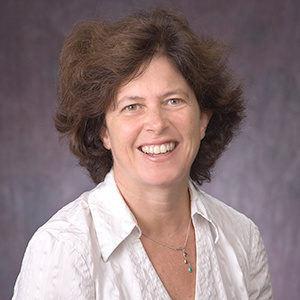
Lecture: Manuel Veth
Date: Sept. 19, 2019
“The Integration of Soccer and Politics in the 21st Century,” a lecture by international soccer journalist Manuel Veth. Veth is the editor-in-chief of the Futbolgrad Network, which focuses on football in the post-Soviet space, the Bundesliga, and football in the Americas. He has also been published in The Guardian, Newsweek, Howler and other outlets. His visit was hosted by the School of Public and International Affairs and the Willson Center.
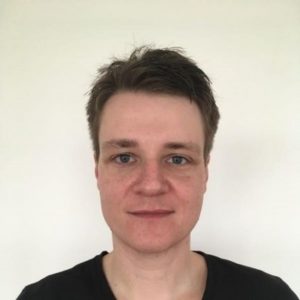
Lecture: Michael Jeffries
Date: Sept. 20, 2019
“Behind the Laughs: Community and Inequality in Comedy,” a lecture by Michael Jeffries, associate professor of American studies, Wellesley College. Sponsored by the Georgia Workshop on Culture, Power and History, a Willson Center Research Seminar.
Jeffries graduated from Swarthmore with a B.A. in sociology/anthropology and earned a Ph.D. in African American Studies from Harvard University in 2008. A qualitative sociologist, he studies race, gender, politics, identity, and popular culture. Jeffries is the author of three books, Behind the Laughs: Community and Inequality in Comedy (2017), Paint the White House Black: Barack Obama and the Meaning of Race in America (2013) and Thug Life: Race, Gender, and the Meaning of Hip-Hop (2011).
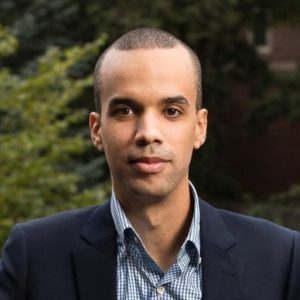
Lecture: Barbara Fuchs
Date: Sept. 23, 2019
“Crusoe’s Absence: Sugar Economies and the Ingenuity of Realism,” a lecture by Barbara Fuchs, professor of English and Spanish and Portuguese at UCLA.
Fuchs’s lecture was hosted by the Early Modern Studies Research Group, an Andrew W. Mellon Foundation grant-funded research project in the Global Georgia Initiative of the Willson Center. Matching funds were provided by Franklin College of Arts and Sciences, the Latin American and Caribbean Studies Institute (LACSI), and the departments of English, history, Romance languages, and film studies; as well as the Bulletin of the Comediantes, a journal devoted to the study of Spanish Golden Age theater.
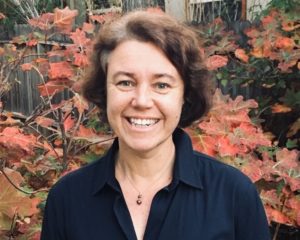
Lecture: Irina Bokova
Date: Oct. 1, 2019
“Preserving Global Cultural Heritage in Times of War and Conflict,” a lecture by Irina Bokova, former director-general of UNESCO.
This lecture was a part of the UGA Signature Lecture Series and was co-sponsored by the Office of the Associate Provost, the College of Environment and Design, HGOR, the School of Public & International Affairs, the Law School, and the Willson Center.
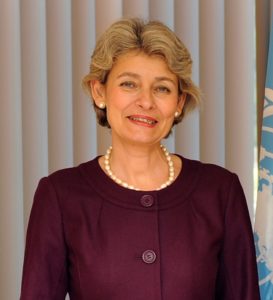
Lecture: William “Bro” Adams
Date: Oct. 3, 2019
“The Wonder of the World: Merleau-Ponty, Cézanne, and the Meaning of Painting,” a lecture by William “Bro” Adams, senior fellow at The Andrew W. Mellon Foundation. This event was hosted by the Willson Center.
Adams was chair of the National Endowment for the Humanities from 2014 to 2017. Prior to joining the NEH, Adams served as president of Colby College in Waterville, Maine, from 2000 until his retirement in 2014. He also served as president of Bucknell University in Lewisburg, Pennsylvania, from 1995–2000.
At the NEH, Adams launched an agency-wide initiative titled The Common Good: Humanities in the Public Square. The initiative seeks to demonstrate the relevance of the humanities to the life of the nation during a time of unprecedented domestic and global challenges.
Adams earned his undergraduate degree in philosophy at Colorado College and a PhD from the history of consciousness program at the University of California, Santa Cruz. He studied in France as a Fulbright Scholar before beginning his career in higher education with appointments to teach political philosophy at Santa Clara University in California and the University of North Carolina at Chapel Hill. He went on to coordinate the Great Works in Western Culture program at Stanford University and to serve as vice president and secretary of Wesleyan University.
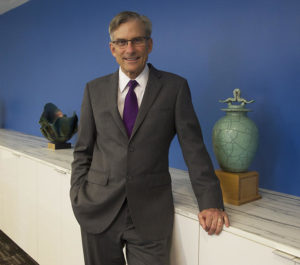
Lecture: Lisa Williamson
Date: Oct. 3, 2019
Lisa Williamson is a Los Angeles based artist from Champaign-Urbana, Illinois. Interested in creating a distinct language over time while following an honest internal logic, Williamson has built a body of work focused on the expressive potential of objects. Material, color, surface, and scale are systematically thought through in her multi-media practice which includes sculpture, painting and drawing.
This talk was hosted by the Lamar Dodd School of art and supported by the Willson Center.
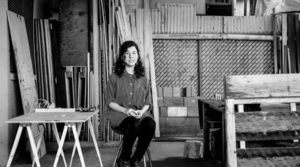
Lecture: Mary Floyd-Wilson
Date: Oct. 4, 2019
“Discerning the Devil Among Us: The Spiritual Instruction of Murder on the Early Modern Stage and Page,” a lecture by Mary Floyd-Wilson, Bowman and Gordon Gray Distinguished Term Professor and chair of the department of English and comparative literature, University of North Carolina at Chapel Hill. Floyd-Wilson’s visit was hosted by the department of English and the Willson Center.
Mary Floyd-Wilson works in the field of early modern English literature, primarily drama placed in cultural, social, and intellectual contexts. Past projects have included readings of Shakespeare’s Othello, Cymbeline, Macbeth, Ben Jonson’s Masque of Blackness, and Christopher Marlowe’s Tamburlaine in relation to the period’s understanding of ethnological differences–a discourse she identifies as “geohumoralism.”
Her work on the history of emotion helped initiate the “affective turn” in early modern literary scholarship. Subsequent research has focused on the sympathies and antipathies (as central to a history of emotion), occult knowledge, and the construction of science in the period; this material has framed readings of Shakespeare’s Twelfth Night, All’s Well That Ends Well, Middleton and Rowley’s The Changeling, Webster’s The Duchess of Malfi, and the anonymous plays, Arden of Faversham and A Warning for Fair Women.
She is currently writing a book titled The Tempter or the Tempted: Demonic Causality on the Shakespearean Stage about the distinct influence of the Protestant devil in early modern culture (with chapters on Thomas Heywood’s A Woman Killed with Kindness, Shakespeare’s Richard III, The Tempest, Macbeth, and Hamlet, Anon, A Yorkshire Tragedy, and Ford, Dekker, and Rowley’s The Witch of Edmonton).
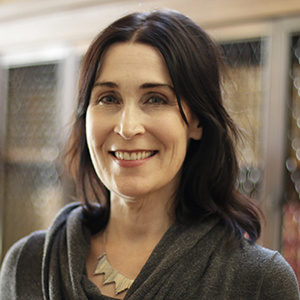
Lecture: Agustín Fuentes
Date: Oct. 4, 2019
“Can’t We All Just Get Along? Hate, Love, Evolution and the Human Way of Being,” a lecture by Agustín Fuentes, Edmund P. Joyce C.S.C. Professor of Anthropology at the University of Notre Dame. This event was part of the Guest Speaker Series of the department of anthropology, cosponsored by the Willson Center.
Fuentes’ research delves into the how and why of being human. Ranging from chasing monkeys in jungles and cities, to exploring the lives of our evolutionary ancestors, to examining what people actually do across the globe, Fuentes is interested in both the big questions and the small details of what makes humans and our closest relatives tick. He has published more than 150 peer reviewed articles and chapters, authored or edited 19 books and a three-volume encyclopedia, and conducted research across four continents and two million years of human history. His current explorations include the roles of creativity and imagination in human evolution, multispecies anthropology, evolutionary theory, and the structures of race and racism. Fuentes is an active public scientist, a well-known blogger and lecturer, and a writer and explorer for National Geographic. Fuentes’ recent books include Race, Monogamy, and Other Lies They Told You: Busting Myths About Human Nature (University of California), The Creative Spark: How Imagination Made Humans Exceptional (Dutton), and Why We Believe: Evolution and the Human Way of Being (Yale).
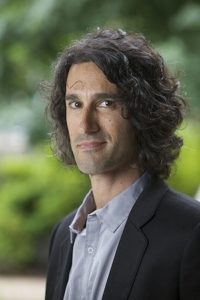
Lecture: Paul Tough
Date: Oct. 7, 2019
Education writer Paul Tough gave a talk associated with his newest book, The Years That Matter Most: How College Makes or Breaks Us. The event was presented by the Willson Center and the Institute of Higher Education at UGA in partnership with Avid Bookshop.
Tough is the author of Helping Children Succeed and How Children Succeed, which spent more than a year on the New York Times hardcover and paperback bestseller lists and was translated into 28 languages. He is also the author of Whatever It Takes: Geoffrey Canada’s Quest to Change Harlem and America. He is a contributing writer to The New York Times Magazine and a regular contributor to the public radio program “This American Life.”
The Years That Matter Most tells the stories of students trying to find their way, with hope, joy, and frustration, through the application process and into college. Drawing on new research, the book reveals how the landscape of higher education has shifted in recent decades and exposes the hidden truths of how the system works and whom it works for. And it introduces us to the people who really make higher education go: admissions directors trying to balance the class and balance the budget, College Board officials scrambling to defend the SAT in the face of mounting evidence that it favors the wealthy, researchers working to unlock the mysteries of the college-student brain, and educators trying to transform potential dropouts into successful graduates.
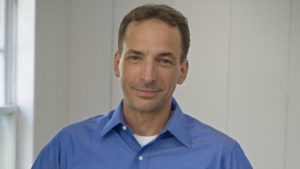
Lecture: Gary Murphy
Date: Oct. 10, 2019
“The Two Irelands, Britain and Brexit,” a lecture by Gary Murphy, professor of law and government at Dublin City University. This event was hosted by Transnational European Studies at UGA, the School of Public and International Affairs, and the Willson Center.
Murphy is a former editor of Irish Political Studies, the leading journal of political science in Ireland. He was president of the Political Studies Association of Ireland from 2009 to 2012.
He has published extensively on the politics of modern Ireland. In 2016 his book Electoral Competition in Ireland Since 1987: The Politics of Triumph and Despair was published by Manchester University Press. It was widely and positively reviewed as a major reinterpretation of modern Ireland over the last three decades. He is also a renowned authority on the regulation of lobbying and is co-author of the book Regulating Lobbying: A Global Comparison. Originally published in 2010 by Manchester University Press, a second edition was published in 2019.
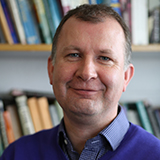
Conversation and performance: DJ Lynnée Denise
Date: Oct. 17, 2019
An evening of conversation and music with DJ Lynnée Denise. The event began with “Let the Beat Hit ’Em: Case Studies in DJ Scholarship,” a conversation between Denise and Atlanta-based music scholar Harold Pride, followed by a community reception and mixer, then a DJ set by Denise.
The event was part of DJ Summits in the Global South, an Andrew W. Mellon Foundation grant-funded research project in the Global Georgia Initiative of the Willson Center.
Lynnée Denise is a Los Angeles- based artist, writer, and academic who practices “DJ Scholarship,” which her official biography describes as a method “to re-position the role of the DJ from a party purveyor to an archivist, cultural custodian and information specialist of music with critical value.” She is a lecturer in Pan African studies and Chicano Studies at California State University, Los Angeles who has presented her DJ Scholarship at Stanford, Yale, Princeton, the Broad Museum, the Tate Modern, and many other universities and institutions around the world. She has written for numerous publications and anthologies, and she has organized conferences in Los Angeles on Michael Jackson, Prince, and Aretha Franklin.
Harold Pride is a community-based lecturer and scholar of Black music. He has presented at conferences across the United States and internationally, often on the music of Prince.

Poetry Reading: Eavan Boland and Alice Friman
Date: Oct. 22, 2019
The Georgia Review celebrated the launch of its Fall 2019 issue with an evening of poetry featuring Eavan Boland and Alice Friman. The event was supported in part by the National Endowment for the Arts, the Lyndon House, and the Willson Center.
Eavan Boland, described by Anne Fogarty in the Irish Book Review as “one of the foremost writers in contemporary Ireland,” is the author of numerous books, most recently, A Poet’s Dublin (2016) and A Woman Without a Country (2014). These works, like most of her books, were published by W. W. Norton. Other poetry volumes include Domestic Violence (2007); Against Love Poetry (2001); The Lost Land (1998); and In a Time of Violence (1994). Boland is also the author of two books of prose: A Journey with Two Maps: Becoming a Woman Poet (2011) and Object Lessons: The Life of the Woman and the Poet in Our Time (1995). Her many honors include a Lannan Foundation Award in poetry and membership in the American Academy of Arts and Sciences as well as the Royal Irish Academy. Boland directs the creative-writing program at Stanford University and divides her time between California and her native Ireland. Boland will be introduced by fellow Georgia Review contributor William Walsh, whose interview “‘Shadows in the Story’: An Interview with Eavan Boland” also appears in the Fall 2019 issue.
Alice Friman, a regular contributor to The Georgia Review, is celebrating the upcoming release of her seventh collection of poetry, Blood Weather, by Louisiana State University Press in November. She’s the winner of a Pushcart Prize and is included in Best American Poetry, among other awards and recognitions. Her poems have appeared in Poetry, The Georgia Review, The Gettysburg Review, Ploughshares, New Letters, The Southern Review, and are forthcoming in The Massachusetts Review, North American Review, Hotel Amerika and others. She lives in Milledgeville, Georgia, where she was poet-in-residence at Georgia College and State University.
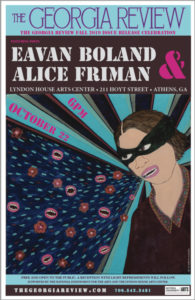
Screening: Tom Petty and the Heartbreakers: Runnin’ Down a Dream with Warren Zanes
Date: Oct. 26, 2019
A screening at Ciné of Peter Bogdonavich’s 2007 concert documentary Tom Petty: Running Down a Dream followed by a Q&A with Petty biographer Warren Zanes. The event was presented by the Grady College of Journalism and Mass Communication, the Terry College Music Business Program, and the Willson Center.
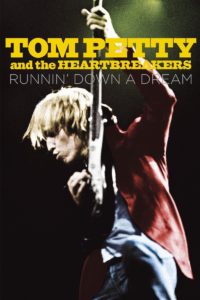
Lecture: Patricia Matthew
Date: Nov. 5, 2019
“‘For Dead Weight’: Sugar, Literature, and Anti-Slavery Material Culture,” a lecture by 2019 Franklin Visiting Fellow Patricia Matthew, associate professor of English at Montclair State University. This event was presented by the Franklin College Office of Inclusion & Diversity Leadership and the Colloquium in Eighteenth and Nineteenth-Century British Literature, a Willson Center Research Seminar.
Matthew teaches courses in British Romanticism, the history of the novel, and British abolitionist literature. She is the co-editor of a special issue for Romantic Pedagogy Commons and has published essays and reviews in Women’s Writing, Nineteenth-Century Gender Studies, and the Keats-Shelley Journal. She is also the editor of Written/Unwritten: Diversity and the Hidden Truths of Tenure (University of North Carolina Press, 2016) and has published essays and books reviews on diversity in higher education in PMLA, The ADE Bulletin, Signs: Journal of Women in Culture and Society, The New Inquiry and The Atlantic. Her work on diversity has been featured in The Chronicle of Higher Education, Inside Higher Ed, and The Los Angeles Review of Books. Matthew is currently writing a monograph about sugar, gender, and British abolitionist literature.
This event received additional support from the English Department’s Rodney Baine Lecture Fund, Isiah Lavender, III (Sterling Goodman Professor of English), John Lowe (Barbara Methvin Professor of English), and the department of history.
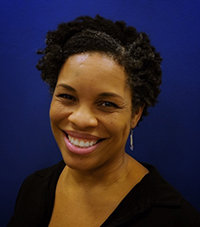
Lecture: Jane Tylus
Date: Nov. 7, 2019
“Italy at the Margins of Empire: Pastoral as a Way of Seeing,” a lecture by Jane Tylus, professor of Italian and comparative literature at Yale University.
Tylus’s lecture was hosted by the Early Modern Studies Research Group, an Andrew W. Mellon Foundation grant-funded research project in the Global Georgia Initiative of the Willson Center. Matching funds were provided by Franklin College of Arts and Sciences, and the departments of English, history, Romance languages, and theatre and film studies.
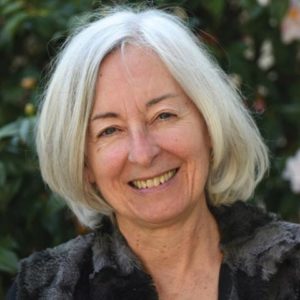
Lecture: Deborah Cohn
Date: Nov. 8, 2019
“Cold War Information Studies: Robert Spiller, the U.S. Information Agency, and the American Studies Certificate,” a lecture by Deborah Cohn, professor of Spanish and Portuguese at Indiana University – Bloomington. Presented by the Willson Center Research Seminar on Cultural and Linguistic Identity in the Americas.
Part of her current research project, “Cold War Humanities,” Cohn’s talk examined the history of an American studies academic certificate developed at the behest of the U.S. Information Agency, which targeted non-citizens outside the United States. The program’s history reveals how academics, universities, and government agencies worked together in the service of national interest.
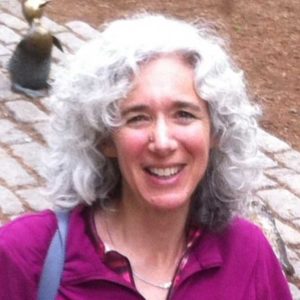
Screening: Blaxploitalian: 100 years of Blackness
Date: Nov. 11, 2019
A free screening of Fred Kuwornu’s film Blaxploitalian: 100 years of Blackness followed by a Q&A session with the filmmaker. The screening was presented by the department of Romance languages and the Willson Center.
Blaxploitalian: 100 Years of Blackness is a diasporic, hybrid, historical, critical, and cosmopolitan dimension documentary that uncovers the careers of a population of entertainers seldom heard from before: African-American and African descent actors in Italian cinema. These engrossing interviews with African-American, Afro-Latino and Afro-Italian actors are interspersed with conversations with international film scholars such as Ruth Ben-Ghiat (NYU), Ed Guerrero (NYU), Shelleen Greene (UCLA), and others. The documentary covers more than a century, from silent and colonial cinema to contemporary cinema.
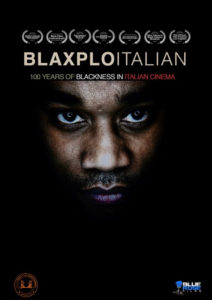
Screening: 18 Ius Soli
Date: Nov. 11, 2019
A free screening of Fred Kuwornu’s film 18 Ius Soli followed by a Q&A session with the filmmaker. The screening was presented by the department of Romance languages and the Willson Center.
18 Ius Soli (The Right of Soil”) examines issues of race, ethnicity, and national identity in 21st-century multicultural Italy. It includes interviews with 18 young men and women born in Italy to immigrant parents who have attended Italian schools, speak Italian, and see themselves as Italian; however they are not Italian citizens due to current law.
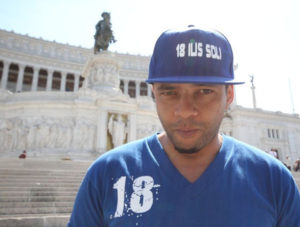
Exhibition: Collages & Paintings by Don Chambers
Date: Nov. – Dec., 2019
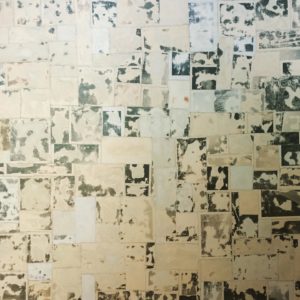
Lecture: Patricia Roberts-Miller
Date: Jan. 14, 2020
“Democratic Deliberation and the Pleasures of Outrage,” a lecture by Patricia Roberts-Miller, professor of rhetoric and writing and director of the University Writing Center at the University of Texas at Austin. Part of the Ballew Lecture Series hosted by the department of English, with additional support from the Willson Center.
Patricia Roberts-Miller is the author of Rhetoric and Demagoguery (2019), Demagoguery and Democracy (2017), Fanatical Schemes: Proslavery Rhetoric and the Tragedy of Consensus (2009), Deliberate Conflict: Argument, Political Theory, and Composition Classes (2004), and Voices in the Wilderness: Public Discourse and the Paradox of the Puritan Rhetoric (1999).
Her talk considered a rhetorical challenge inherent to ideals of democracy: diversity, inclusion, and motivation. Democratic deliberation requires enthusiastic and informed participation on the part of people with diverse views and experiences; so, not just inclusion, but participation is crucial. The most straightforward (and effective) rhetorical strategy to increase participation is demagogic mobilizing of groups against each other, a strategy that undermines diversity and inclusion.
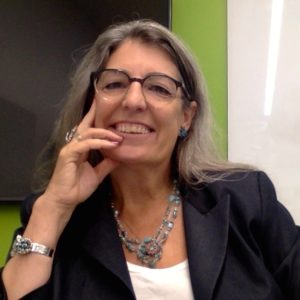
Workshop: Gus Kaikkonen
Date: Jan. 17, 2020
New York theatre director Gus Kaikkonen led a workshop based on his translation of Molière’s Tartuffe.
The workshop was hosted by the Early Modern Studies Research Group, an Andrew W. Mellon Foundation grant-funded research project in the Global Georgia Initiative of the Willson Center.
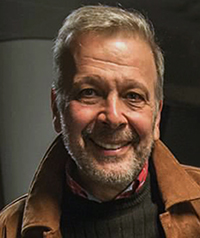
Lecture: John Greaney
Date: Jan. 30, 2020
“Irish Modernism, Memory and Narrative: The Examples of Bowen and Beckett,” a lecture by John Greaney, NUI-Fulbright postdoctoral scholar at the University of Pennsylvania.
Greaney lectures and tutors in University College Dublin and Maynooth University. His research interests include modernist studies, Irish studies, critical theory and continental philosophy. His work has been featured in Irish Studies Review and Textual Practice, and he is co-editing Irish Modernisms: Gaps, Conjectures Possibilities with Tamara Radak and Paul Fagan. As an NUI-Fulbright postdoctoral fellow at the University of Pennsylvania, he is undertaking research for his monograph The Distance of Irish Modernism, which investigates the paradox through which the Irish modernist novel becomes both a container for national history and a mode of world literature.
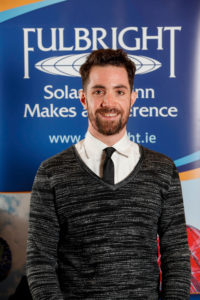
Discussion and Poetry Reading: Kazim Ali
Date: Jan. 30, 2020
The Georgia Review celebrated the launch of its Winter 2019 issue by hosting a reading and discussion centered on the theme “queer faith.” Internationally renowned writer Kazim Ali and Lee Cornell, an active member of the Unitarian Universalist Fellowship of Athens, each read from their respective work followed by a conversation moderated by Joshua Patterson, Ph.D. candidate in the UGA Institute of Higher Education and co-organizer of the Willson Center research seminar Religion and the Common Good. The event was supported in part by the National Endowment for the Arts.
Kazim Ali was born in the United Kingdom to Muslim parents of Indian, Iranian, and Egyptian descent. His books encompass several volumes of poetry, most recently Inquisition (Wesleyan University Press, 2018); his prose works include the hybrid memoir Silver Road: Essays, Maps & Calligraphies (Tupelo Press, 2018), the novel The Secret Room: A String Quartet (Kaya Press, 2017), and Fasting for Ramadan: Notes from a Spiritual Practice (Tupelo Press, 2011). “The Voice of Sheila Chandra,” which appears in the Winter 2019 issue of The Georgia Review, is the title poem of Ali’s next collection, forthcoming from Alice James Books in October 2020. He is currently a professor of literature and writing at the University of California, San Diego.
Cornell has been a member of the Unitarian Universalist Fellowship of Athens since 2013, supporting the congregation’s mission and vision as a member of the choir, Worship Arts Team, and Leadership Development Team, among other groups and committees. An active seeker of wisdom, he has reflected on texts from many religions starting in his teens and has landed on a faith based in the philosophy of Taoism and the power of love. He embraces above all else the Fourth Principle of Unitarian Universalism: “A free and responsible search for truth and meaning.”
Neil Golden provided prelude and postlude music.
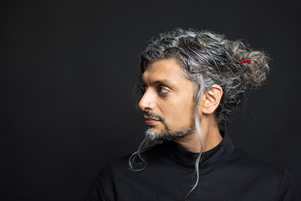
Colloquium: André Brock
Date: Feb. 7, 2020
“Doubly Conscious: Black Cybercultures,” a presentation by André Brock, associate professor of media studies at Georgia Tech. Brock’s visit was part of the Sociology Colloquium Series and was sponsored by the Georgia Workshop on Culture, Power and History, a Willson Center Research Seminar.
Brock’s scholarship examines racial representations in videogames, black women and weblogs, whiteness, blackness, and digital technoculture, as well as innovative and groundbreaking research on Black Twitter. His book Distributed Blackness: African American Cybercultures (NYU Press, February 2020) offers an innovative approach to understanding Black everyday lives mediated by digital technologies.
His presentation offered a critical approach to new media research and digital sociology, reorienting Western technoculture’s practices of “race-as-technology” (Chun 2009) to visualize Blackness as technological subjects rather than as “things.” Utilizing critical technocultural discourse analysis (Brock 2018), and drawing from his upcoming book Distributed Blackness, Brock employed Afro-optimism, libidinal economic theory, interface analysis, and critical race theory to illuminate Black Twitter as an exemplar of Black cyberculture: digital practice and artifacts informed by a Black aesthetic.
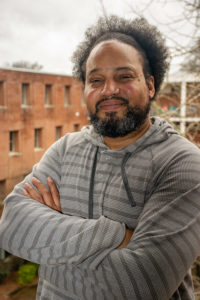
Lecture: Antwain Hunter
Date: Feb. 7, 2020
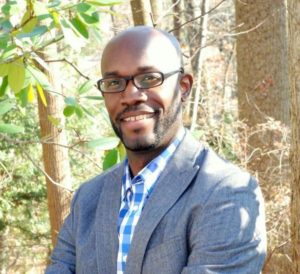
Reading: Neil Hegarty
Date: Feb. 17, 2020
Neil Hegarty was born in Derry in Northern Ireland and now lives in Dublin. He holds a doctoral degree in English from Trinity College Dublin, and has written a number of key works in cultural history, including the bestselling Story of Ireland (BBC Books), which accompanies the BBC television series; and London: The Secret History of our Streets (BBC Books). Hegarty’s visit was hosted by the Willson Center.
Hegarty’s essays, short fiction, reviews and journalism have been published widely, including in the Daily Telegraph, Irish Times, Dublin Review, Stinging Fly, Warwick Review, BBC History and Huffington Post. His radio play The Story of Peggy Mountain was shortlisted for the PJ O’Connor Award.
Hegarty’s 2016 novel Inch Levels was shortlisted for the Kerry Group Novel of the Year award in 2017. Of his latest novel, The Jewel, published by Head of Zeus in 2019, the Irish Times wrote: “Hegarty has gifted us a vital book for our time.”
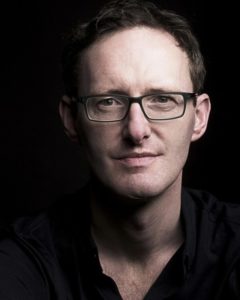
Lecture: Willis Jenkins
Date: Feb. 19, 2020
“The Sacred Anthropocene: On Religious Interpretations of Planetary Change,” a lecture by Willis Jenkins, professor of religion, ethics, and environment at the University of Virginia. Jenkins’ talk was presented by the Willson Center in partnership with the departments of anthropology and religion and the Coasts, Climates, the Humanities, and the Environment Consortium.
Jenkins is the author of two award-winning books, Ecologies of Grace: Environmental Ethics & Christian Theology (Oxford 2008) and The Future of Ethics: Sustainability, Social Justice, & Religious Creativity (Georgetown 2013), which won an American Academy of Religion Award for Excellence. He is editor of a number of volumes including, with Mary Evelyn Tucker and John Grim, the Routledge Handbook of Religion & Ecology (2017).
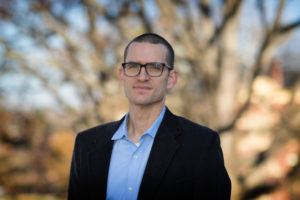
Lecture: Mildred Barya
Date: Feb. 20, 2020
Mildred Barya gave a talk on her poetry. Barya is a Ugandan poet and fiction writer who has authored three poetry books: Give Me Room to Move My Feet (Amalion Publishing, 2009), The Price of Memory After the Tsunami (Mallory International, 2006), and Men Love Chocolates But They Don’t Say (Femrite Publications, 2002). She teaches creative writing at University of North Carolina, Asheville, and is a board member of African Writers Trust.
This event was organized by COMPASS, the Comparative Literature Graduate Student Organization at UGA, in conjunction with the African Studies Institute, the department of comparative literature and intercultural studies, and the Willson Center.
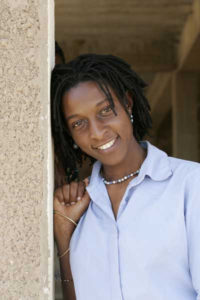
Colloquium: Rory McVeigh
Date: Feb. 21, 2020
“The Politics of Losing: Trump, the Klan, and the Mainstreaming of Resentment,” a presentation by Rory McVeigh, professor of sociology, University of Notre Dame. McVeigh’s’s visit was part of the Sociology Colloquium Series and was sponsored by the Georgia Workshop on Culture, Power and History, a Willson Center Research Seminar.
McVeigh is the director of The Center for the Study of Social Movements and co-editor of American Sociological Review. His research focuses on identifying structural foundations of social conflict and investigating long-term consequences of social movement mobilization. Much of his recent work addresses social and political consequences of different forms of segregation. He is the author of The Rise of the Ku Klux Klan: Right-Wing Movements and National Politics (University of Minnesota Press, 2009). Recent publications include “Political Polarization as a Social Movement Outcome: 1960s Klan Activism and its Enduring Impact on Political Realignment in Southern Counties, 1960-2000” (with David Cunningham and Justin Farrell in American Sociological Review, December 2014), “Educational Segregation, Tea Party Organizations, and Battles over Distributive Justice (with Kraig Beyerlein, Burrel Vann Jr., and Priyamvada Trivedi in American Sociological Review, September 2014), and “Plausibility Structures, Status Threats, and the Establishment of Anti-Abortion Pregnancy Centers” (with Bryant Crubaugh and Kevin Estep in American Journal of Sociology (November 2016).
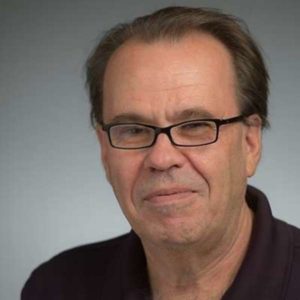
Lecture: Jessica Harland-Jacobs
Date: Feb. 27, 2020
“Atlantic Georgia: Freemasonry, Religion, and the 18th-Century British Empire,” a lecture by Jessica Harland-Jacobs, associate professor of history at the University of Florida. This lecture was hosted by the Early Modern Studies Research Group, an Andrew W. Mellon Foundation grant-funded research project in the Global Georgia Initiative of the Willson Center, with added support from a Department-Invited Lecturer grant from the Willson Center.
Jessica Harland-Jacobs’ first book, Builders of Empire: Freemasonry and British Imperialism, 1717-1927, was published by the University of North Carolina Press in 2007. It is the first study of the relationship between freemasonry and British imperialism, and convincingly demonstrates that British freemasons were effective builders of a global empire over two centuries and five continents (Europe, Africa, Asia, North America/Caribbean, Australasia). Harland-Jacobs traces how this relatively new social organization created a universal network that reinforced British values and objectives in vastly distant and different locales, which in turn impacted the brotherhood. She also addresses the issues of globalization, imperial power, supranational identity, and masculinity.
Harland-Jacobs has recently co-edited a special issue of Atlantic Studies on “The Fraternal Atlantic.” Her current project examines the incorporation of Catholic colonies into the British Empire during the long eighteenth century.
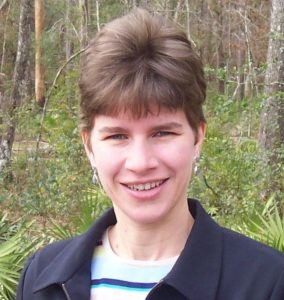
Symposium on the Book
Date: Mar. 2, 2020
As part of the Spring 2020 Symposium on the Book, the department of English presented an archival research roundtable on 17th and 18th century studies, featuring UGA graduate students and recent graduates. Each scholar discussed their use of material culture and archival materials in their research. The participants were Courtney Hoffman (Georgia Tech, English), Elizabeth Kennison (History), Sarah Mayo (English), Alicia Wies (English).
The roundtable discussion was followed by “Making Paper Windows to the Past: Eighteenth-Century Extra-Illustration and the Art of Writing,” a lecture by Julie Park, assistant curator and faculty fellow at the Bobst Library’s Special Collections Center and visiting faculty in the English department of New York University.
Park is a material and visual culture scholar of 17th- and 18th-century England who works at the intersections of literary studies, information studies and textual materiality. Her research examines the unexpected ways in which human subjects are inseparable from the material things, environments and devices of everyday life in historical contexts. She writes about such artifacts, tools and spaces as automata, quill pens, notebooks, grottoes and follies, exploring their abilities to shape, channel and model the innermost experiences of the embodied self in everyday life.
The Symposium on the Book is a Willson Center Research Seminar. It is presented in partnership with the department of English and the University of Georgia Libraries.
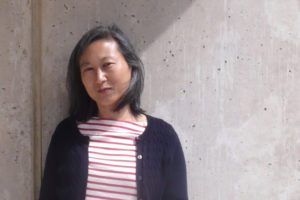
Lecture and Performance: Ama Aduonum
Date: Mar. 3, 2020
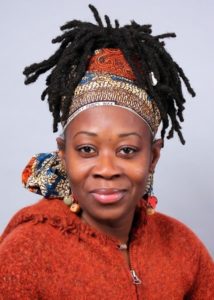
Artist Talk: Dynasty Handbag (Jibz Cameron)
Date: Mar. 6, 2020
A conversation with performer and artist Dynasty Handbag (also known as Jibz Cameron), part of Ad•verse Fest and presented with support from the Willson Center.
Jibz Cameron is a performer and video artist living in Los Angeles. Her multi-media performance work as alter ego Dynasty Handbag has spanned 15 years and been presented at such institutions as MOCALA, PS1, The Kitchen, REDCAT, and The Broad Museum, among others. She has been heralded by The New York Times as “the funniest and most pitch perfect performance seen in years” and as “outrageously smart, grotesque and innovative” by The New Yorker. She has written and produced seven evening-length performance pieces and countless short works. She has produced multiple video works and two albums of original music.
In addition to her work as Dynasty Handbag she has also been seen acting in films, theater and television. She works as a professor of performance and comedy related subjects. She also produces and hosts Weirdo Night, a monthly comedy and performance event in Los Angeles.
Ad•verse Fest was a two-day festival showcasing a variety of solo and duo performers who blur the line between the musical, visual, and performative arts.

